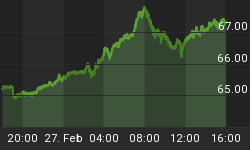One of the reasons we've all heard of George Soros is that back in 1992 he pulled off an epic financial coup by "breaking" the Bank of England. At the time the UK was trying to maintain a loose peg with the German Deutsche Mark, despite the fact that the two countries hadvery different rates of inflation (UK's high, Germany's low).
To Soros' practiced eye, this imbalance was clearly unsustainable and would eventually force the UK to devalue its currency to reflect the fact that it was living beyond its means and printing way too many pounds. Soros placed a big bet against the pound and sat back while the fundamentals won out. When Britain gave in and devalued, Soros made a billion dollars and became a household name.
Ever since, currency traders have dreamed of such conjunctions of government mismanagement and central bank cluelessness, hoping for their own Soros-level killings. But during the past couple of decades such sure things have been rare because currencies have floated more or less freely, which prevented huge imbalances from building up.
Now, however, thanks to the mess that is the eurozone and several other countries' ill-advised dollar pegs, the world is once again a target-rich environment for speculators. The Swiss, for instance, have been going a little crazy trying to decide whether and/or how to peg the franc to the euro. And China, which runs a loose peg to the dollar, is looking like it might have to adjust its thinking in the not too distant future.
But right now the juiciest target is Denmark. A generally well-run country, it finds itself on the wrong side of the currency war, with the European Central Bank actively devaluing the euro against which the Danish krone is pegged. Capital has been flowing into Danish bonds seeking the relative safety of low inflation and stable state finances, which is pushing up the value of the krone. Maintaining the peg thus requires the Danes to create a lot of new kroner and use them to buy euros.
A soaring supply of national currency is inherently inflationary and destabilizing, which is the opposite of "well-run". So just as the Swiss did last year, the Danes are both promising to maintain the peg and stressing out over the cost of doing so. Now the speculators smell blood:
Speculation Against Danish Euro Peg Proving Relentless
(Bloomberg) -- Less than a week after Denmark resorted to its deepest rate cut ever amid historic currency interventions, forward rates suggest some traders and investors still aren't convinced the central bank can save its euro peg.SEB AB, the largest Nordic currency trader, says capital flows into AAA-rated Denmark forced the central bank to dump about $4.6 billion in kroner in the first three days of February alone, almost a third the record amount it sold in all of January. Nordea Bank AB, Scandinavia's biggest lender, says Denmark will need to deliver another 25 basis-point cut to fight back demand for kroner, bringing the benchmark deposit rate to minus 1 percent.
"The pressure on the krone hasn't eased yet," Jens Naervig Pedersen, an economist at Danske Bank A/S in Copenhagen, said by phone. "We can see from the forward rates that the market views the current upward pressure on the krone as the greatest ever."
Governor Lars Rohde addressed speculators last week in what he characterized as a verbal intervention to persuade them he won't let the krone's peg to the euro collapse. Such a scenario is "unthinkable" and the central bank will do "whatever it takes" to avoid it, he said after delivering a fourth rate cut in less than three weeks.
Denmark's largest institutional investor, ATP, sent a clear message of trust in the peg the same day, revealing it hasn't bothered to hedge its $110 billion in assets against the possibility that the nation's currency regime might break.
Make no mistake, the Danes are the victims here. They're behaving the way a country should behave, with an eye to long term stability. But the rest of the world -- the eurozone in particular -- is so indebted that its only choice is to inflate or die.
Which leaves solid countries like Denmark and Switzerland with a similar choice: inflate and throw decades of prudent management out the window, or watch their currencies soar against those of a profligate world, causing their export sectors to go extinct and their economies to slip into Depression.
The speculators, meanwhile, are not the villains in this story. They're just pointing out the truth with their capital. And their honesty will be rewarded very soon.















